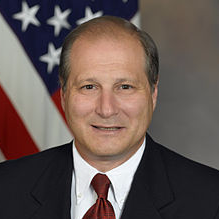Flight Risk: Turkey and the F-35
Turkey wants back into the F-35 program, after having been blocked by the United States from procuring and producing the American F-35 fifth generation fighter in 2019. The decision to block came after numerous warnings to Turkey over its decision to acquire the Russian S-400 air and missile defense system. Now, given Turkey’s rising role in the region, the United States must carefully consider whether a potentially threatening, regional power, led by the authoritarian, pro-Hamas, neo-Ottoman President Recep Tayyip Erdogan, can be trusted with this advanced jet. Yet, it appears the Trump administration is favorably disposed to grant Turkey’s request.
There are many good reasons to be dubious of the wisdom of granting Turkey’s request. Turkey’s history with the F-35 is but one recent example—alongside Turkish behavior regarding Russia, Israel, Syria, and the Eastern Mediterranean—that demonstrates that Erdogan is frequently at odds with U.S. policy. Despite the concerns about Ankara’s behavior, it remains true that Turkish and American interests align in a number of important areas. In the long-term, facing a growing coordination between Russia, Iran, and China, having a strong Turkey as a cooperative and trustworthy partner would be highly beneficial to the United States.
Faced with these considerations, the question confronting the United States about Turkey’s request for re-entry into the F-35 program should be understood as: Turkey will be a major regional actor with or without the F-35, but, by providing Ankara with access to the advanced jet, can Washington have some salutary impact on how it acts?
To answer this question and provide analysis and guidance to U.S. policymakers, JINSA just issued a new report, Flight Risk: Turkey and the F-35.
To discuss the report and its recommendations, JINSA will be hosting a panel discussion with the report’s co-authors, leading Turkey experts JINSA Distinguished Scholar and former U.S. Ambassador to Turkey Amb. Eric Edelman and JINSA Scholar Svante Cornell.
JINSA’s Vice President for Policy Blaise Misztal will moderate the conversation.
|
Wednesday, April 30 | 2:00PM ET |
This webinar is open exclusively to JINSA RSVPs must be received via the button Once your registration is confirmed, you will |

Svante E. Cornell Svante E. Cornell is a JINSA Scholar, the Director of the American Foreign Policy Council’s Central Asia-Caucasus Institute, and a co-founder of the Institute for Security and Development Policy, Stockholm. His main areas of expertise are security issues, state-building, and transnational crime in Southwest and Central Asia, with a specific focus on the Caucasus and Turkey. He is the Editor of CACI’s Central Asia-Caucasus Analyst and Turkey Analyst, the Center’s electronic publications, and of its Silk Road Papers series of occasional papers. |

Amb. Eric Edelman Amb. Eric Edelman is a Distinguished Scholar at JINSA’s Gemunder Center for Defense & Strategy and the Co-Chair of its Iran Policy Project and Eastern Mediterranean Policy Project. Amb. Edelman served in senior positions at the Departments of State and Defense as well as the White House and served as the Undersecretary of Defense for Policy from August 2005 to January 2009. Amb. Edelman served as U.S. ambassador to the Republics of Finland and Turkey in the Clinton and Bush Administrations and was principal deputy assistant to the vice president for national security affairs. |

Blaise Misztal Blaise Misztal is the Vice President for Policy at JINSA. His research interests include Iran and its nuclear program, U.S.-Turkey relations, countering extremism, and strategic competition. Misztal served as the Executive Director of the Task Force on Extremism in Fragile States, a congressionally mandated project convened by the U.S. Institute of Peace, and Director of the Bipartisan Policy Center’s National Security Program. He has testified before Congress and published widely—including op-eds in the Washington Post, Wall Street Journal, New Republic, and Roll Call. |